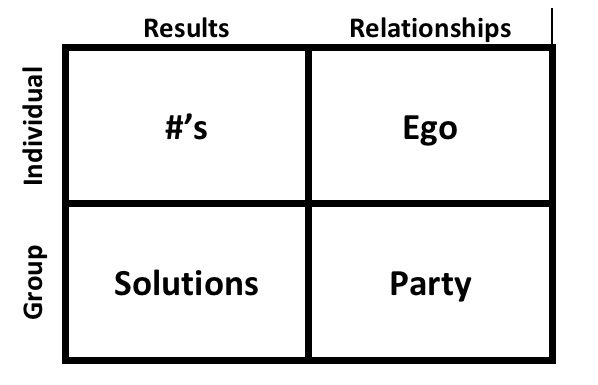Ambiguity is causing you stress.
Ambiguity is causing you stress at work. Not knowing is actually worse than knowing the worst. I attribute this line of thinking to one of my mentors, Bobb Bheil, who was fond of saying “When you know all the facts, decisions become easy.”
I know ambiguity causes stress. It causes me stress in my life and work, and it is causing you stress as well. We have done some research to identify the top causes of work-related stress and there are two causes which are similar and which trend equally high in the rankings. (We will unveil the number one cause of stress in our next post).
The Research:
When respondents were asked what their top three sources of work-related stress were, the following answers ranked #2 and #3:
41% checked Communication: Poor communication from management about performance, professional development, and company future.
37% checked Ambiguity: Role ambiguity due to unclear structure or poor communication.
We sum up the findings in this sentence:
Lack of Clarity from Management is a top causes of stress in your work.
It is unlikely you will be able to wave a wand and magically derive clarity from your manager, so what can you do to increase communications, decrease ambiguity, and thereby perform better, by lessening unnecessary job-related stress?
Four Ways to Receive Greater Clarity from Management
- Understand Your Boss’s Motivation
Lack of clarity from your boss, means you need to influence her to get what you need. Influencing her means understanding her primary motivational profile and building up the capital to get something she has not been naturally giving. Consider the following diagram:
Some bosses are more motivated by results and some are more motivated by relationships.
Some bosses tend to approach their reports more individually, and some are more group or team oriented.
These two scales yield the following taxonomy: identify your boss and make the right play to build the relational capital required to gain the clarity you need.
#’s: This boss is motivated by results. “Show me the score.”
Cardinal Sin: Not making your number.
The Sweet Spot: Exceeding the estimate.
Practice: Quickly learn what it takes to put numbers on the board and do it.
Ego: This boss is motivated by personally winning, not by you nor the team winning.
Cardinal Sin: disparaging the boss
The Sweet Spot: make them look good through results and praise..
Practice: find ways to authentically celebrate the bosses strengths and achievements
Party: The “party” boss is motivated by the feeling that we’re one big happy family, having fun.
Cardinal Sin: Not showing up and jumping to business too fast.
The Sweet Spot: Be relaxed and ready to hang out.
Practice: Keep your own results score and only trot it out when needed.
Solutions: This boss listens to the team for practical solutions that help the group win.
Cardinal Sin: Criticism without solutions and an individualistic approach to advancement.
The Sweet Spot: Practical suggestions that make the team better.
Practice: Always have a plan to fix the problems you see, understand how you’ll sell it to the team, and make those solutions happen.
Using the above Boss Paradigm, how well are you connecting with your supervisor.
- Identify the Winners and Losers
Every firm, every division, every office, has its winners and losers. Identify them and the characteristics of each. There are official job descriptions and rewards programs, but they don’t always match reality. You need to know what the unofficial rewards system (the real rewards system) happens to be. If you can find a winner who is trustworthy and safe, ask them “who wins and who loses here and why?”
By gaining this information you will know 1) what it takes to have influence and esteem and 2) whether or not you should be playing this game or not.
- Make your own Scorecard?
A scorecard is a way to measure how you are doing. Some companies have their own and it is embedded in the HR system for performance management, bonuses, and promotions. Most companies do not provide you with a scorecard. I know an office manager who tracks how much money she is saving her company. I know an IT professional whose boss was never around or interested, so he developed a spreadsheet of all the projects he was picking up, the time invested, and the benefit those projects provided. I knew an admin who regularly tracked her time so her boss would know how much time she was working and what she was working on.
Your scorecard has to include time and results. It’s how you prove your value and your commitment, both of which will come in handy when you get to step four.
- Qualified Asks: The only person who can clear up the ambiguity and stress that comes from a lack of managerial clarity is your manager! So you have to develop a customized and professional way of interacting which radically eliminates ambiguity from your work.
Before you ask.
- Be well organized, know your tasks and their current status, and the time required to do them.
- Make sure you are prepared to be solutions and team focused. If your boss is overwhelmed, he is unlikely to care that you are overwhelmed and stressed.
- Think through your language so you don’t appear overly needy or whiney. Most bosses like to advise competent people who are stuck. Most of them don’t want to carry a needy person on their team.
Making the Ask.
- Communicate with your boss on their terms. If she prefers texting, then text; emailing, then email; discussing over dinner, then over dinner; walking to her next meeting, cabbing to a client, riding to the airport, whatever; adapt to them.
- Ask for advice: “I’ve got these six projects going, how would you advise me to prioritize them?”
- Every now and then ask, “How do you think I’m doing in this role, or how could I be even more effective? If she is an introvert, do not expect a good answer in a live conversation. Either email her the question or ask if you can follow up in a few days. If she is an extrovert, expect her to think out loud with you about how you are doing (which could be painful). Ask for a summary at the end.
Repeat this process often enough to stay on course, but no so often that you are annoying. That will depend on the nature of your work and the personality of your boss.
How About You?
- Based on this post, what are three things you will do differently to gain more clarity from your boss?
- If you are a boss, how can you improve the clarity your reports experience under your leadership?
Take Our Job Stress Poll:
Tell us about what causes stress for you on the job.
About Your Author
Dr. Chip Roper writes Marketplace Faith from New York City, where he is the Founder and President of the VOCA Center. Chip is passionate about making work better by empowering clients with a keen sense of vocational identity. In service of this vision, Dr. Roper provides coaching, training, and consulting to individuals and organizations in NYC and beyond. Download information about his work as an executive coach and VOCA’s Calling Discernment Program , and visit our faith-based website at vocacenter.org and our market-facing menu of services at www.vocacenter.com.














